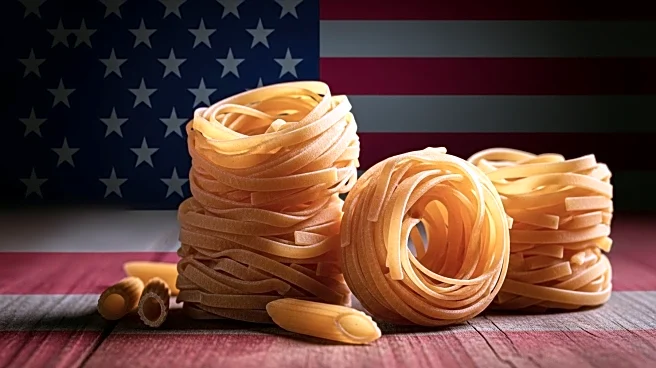What is the story about?
What's Happening?
Italy's largest agriculture organization, Coldiretti, has raised concerns over potential additional tariffs on pasta exports to the United States. The U.S. Department of Commerce, through its International Trade Commission, has completed a review and identified Italian manufacturers Molisana and Pastificio Lucio Garofalo for selling pasta at less than normal value from July 2023 to June 2024. This could lead to a 91.7% duty being imposed in January, on top of the existing 15% tariff on EU goods. Coldiretti warns that these tariffs would severely impact Italian pasta exports, valued at €671 million ($782.3 million) last year, and could lead to increased prices for U.S. consumers and encourage imitations of Italian products. The Italian Ministry of Foreign Affairs is actively working with affected companies and the European Commission to address these provisional duties.
Why It's Important?
The imposition of these tariffs could have significant economic repercussions for both Italian exporters and U.S. consumers. Italian pasta producers face the risk of losing substantial revenue, which could erase years of growth and investment in the sector. For U.S. consumers, the increased tariffs may lead to higher prices for imported Italian pasta, potentially reducing demand and encouraging the production of imitation products. This situation highlights the ongoing trade tensions between the U.S. and the EU, and the potential for such measures to disrupt international trade and economic relations.
What's Next?
The Italian Ministry of Foreign Affairs is hopeful that the U.S. will recognize the integrity and cooperation of Italian producers in the ongoing investigation. The Ministry has formally intervened in the proceedings through its embassy in Washington to assist the companies in asserting their rights. Coldiretti is urging the Italian government and the EU to take decisive action to protect the pasta industry, which is considered a symbol of the Mediterranean diet and Italy's agri-food identity. The outcome of these efforts and the U.S. Department of Commerce's final decision on the tariffs will be crucial in determining the future of Italian pasta exports to the U.S.
Beyond the Headlines
The situation underscores the broader implications of trade policies and their impact on cultural and economic identities. Italian pasta is not only a staple food but also a cultural symbol, and the potential loss of market share in the U.S. could affect Italy's global culinary influence. Additionally, the tariffs could lead to shifts in consumer preferences and market dynamics, as U.S. producers may seek to fill the gap left by reduced Italian imports.














